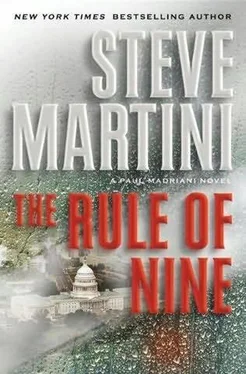“When you say a lot of blood, did it sound like a rage killing?”
“No,” says Herman. “That’s the problem. It’s more like whoever did it knew what they were doing. They couldn’t be absolutely certain, but according to the paramedics it looked like there were only two stab wounds.” Herman stops and looks at Sarah. “You really don’t want to be listening to this stuff,” he tells her.
“She was my friend. I want to hear it all. Every bit of it. I want to know who did it and why.”
Herman looks to me for a reprieve.
I shrug my shoulders. “She’s an adult, as she keeps reminding me.”
“You’re the one’s gotta stay up with her when she gets nightmares. Both wounds were well placed. Seems they caught all the vital organ systems. To get that much blood it’s either that or a main artery. They didn’t get a real good look at the two wounds. They weren’t doin’ a postmortem,” he says. “As soon as they confirmed she was dead, they backed out of the room and tried not to disturb anything any more than they had to. But one of ’em said the wounds looked small and narrow. It was not a wide-bladed weapon, but deep, like maybe whoever did it might have used a long-bladed shiv or a stiletto.”
Herman can tell this has my attention.
“Anything else?” I ask.
“Like what?”
“Like maybe fingerprints?”
“You mean…”
“Yeah.” My darkest dream, the one I will curl up with tonight, is that forensics will find an itinerant thumbprint at the scene, one they cannot exclude or identify.
“It’s too early.” Herman turns his nose up. “They wouldn’t have had time to pull all the latents yet and check ’em against the victim and anybody else who had regular access to the house.”
“So there’s no way to know,” I say.
Herman shakes his head. “We’ll have to wait and see,” he says.
“Wait for what?” says Sarah.
“To see if they can identify a perpetrator from the fingerprints,” I tell her.
“I see.”
Herman looks at me, round eyed, as if perhaps I should tell her.
“Oh, I am,” I whisper to him. “Got no choice now.”
“You gonna tell her all of it?” he whispers back.
“All of it, including what you and I did,” I tell him.
“What are you two talking about?” says Sarah.
“I was asking Herman if he wanted to join us for a cup of coffee in the kitchen.”
“I’d like to, but I gotta go,” he says.
“Nonsense.” I have one hand on his shoulder, steering him toward the kitchen. “Come on, Sarah, there are some things we need to talk about.”
Snyder slept fitfully on the red-eye flight from L.A. back to Chicago. By the time he arrived at O’Hare, it was five in the morning and he was exhausted. He couldn’t remember the last time he’d had a full night’s sleep. It was before his son was murdered, of that he was sure. Even with all the medications given to him by his doctor, a cornucopia of antidepressants and antianxiety drugs, Snyder was unable to dodge the pain.
He looked down at the notepad lying on his lap-“aka Dean Belden.” The man’s photograph walking next to Jimmie was now branded on Snyder’s fevered brain. He hoped that Cole was right. If so, it was something he could feed to the FBI and perhaps harvest some information in return.
One thing bothered him. Snyder was convinced there was something Madriani wasn’t telling him. Whether it had to do with Jimmie’s murder he couldn’t be sure. The tip-off was in the needling current of inquiry directed by Cole at Madriani during lunch, her observations about the business card in Jimmie’s wallet and the thumbprint, her uptake on Liquida and the danger this posed to Madriani, and the obvious fact that the lawyer was already well aware of this but wasn’t saying anything. What else did he know that he wasn’t telling them?
It provoked questions regarding some of the background research Snyder had done on Madriani. The night before he left for San Diego he ran a couple of online news site searches and Googled Madriani’s name. Most of what came back was the usual stuff you might expect concerning a criminal defense lawyer, news on cases Madriani had tried.
But there was one item, more recent, that caught his attention. Madriani’s name popped up in connection with the attack on the Coronado naval base. This was one of those seminal events that the entire world knew about because of the blanket coverage on the cable news networks. It never rang any bells with the name Madriani until Snyder read the news articles online. At first he figured Madriani must have defended someone in connection with the case until he realized that the lawyer had been taken into custody in the shootout. When he saw this, and knowing that Madriani’s business card was found in his son’s wallet, the adrenaline began to spike in Snyder’s body. He was sure he had something. He wasted two hours reading news articles until in the end it all turned out to be smoke. Or was it? According to the FBI, Madriani and one of his employees happened to be in the wrong place at the wrong time and were caught up in the law enforcement net after the shootout.
The second he got home, Snyder dropped his luggage inside the front door and headed for the study. The large, stately home in the North Shore area of Chicago was dark and empty. Snyder had lived alone ever since the divorce from his wife five years earlier.
He turned on the floor lamp, plopped himself down in front of his desktop, and hit the browser button.
Snyder had already hired a private investigator. Now he would feed him all of the information he had gathered on his trip to San Diego. He fired off an e-mail to the investigator, giving him the name Liquida and the term “the Mexicutioner” along with the rumor that he worked for the Mexican drug cartel in Tijuana. He laid it all out, including the thumbprint on the business card, and then typed in the name Thorn and his alias, Dean Belden. He told the investigator to gather any information he could find under the name Belden regarding a federal grand jury investigation and a floatplane crash on Lake Union in Seattle and gave him the approximate time frame for the events. Snyder told the investigator that he needed whatever information he could find, and that he needed it immediately. He told him he was willing to pay a premium by way of fees for thorough and prompt service and that he would be waiting for a reply ASAP. He hit the Send button.
Then Snyder pulled out his wallet and located Joselyn Cole’s business card. The meeting in San Diego had come to an abrupt end when Madriani had to leave his office, something about a family emergency. Cole and Snyder exchanged business cards and agreed to keep in touch. Snyder told her he would lay heavy hands on the FBI turning over the information on Thorn, and promised to keep her informed as to what he learned.
He entered her name and all of the contact information from her business card into the contact list on his computer. Then he synchronized it to his BlackBerry so that he could call her or shoot e-mails to her from the road.
He navigated to one of his tailored news sites on the Web and hit the button for advanced searches. He went to the line that read “Find results with the exact phrase” and typed in the name Joselyn Cole in the box next to it. Snyder scanned down the page to make sure he would capture everything back for a period of one year. Then he hit the Search button. He knew he wouldn’t find anything on Thorn or Belden or the grand jury stuff in Seattle. Those events went back too far, beyond the time of Internet news sites. And not many newspapers made their news morgues available online, even for a fee.
The search under Cole’s name produced a few news articles, one reporting on a press conference held by Cole’s organization, Gideon Quest, dealing with the issue of land mines in Africa and Asia. Cole and her organization seemed to have a particular brief for arms merchants and the manufacturers who produced their wares.
Читать дальше












